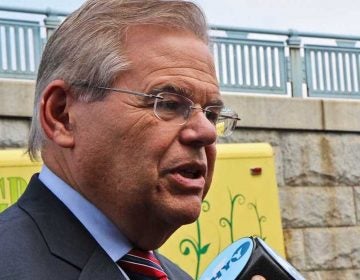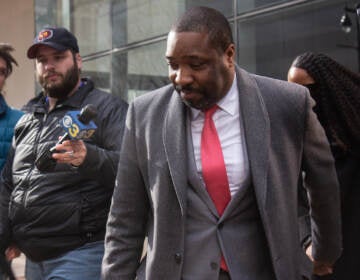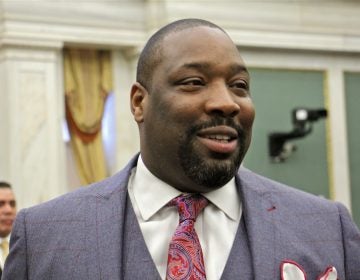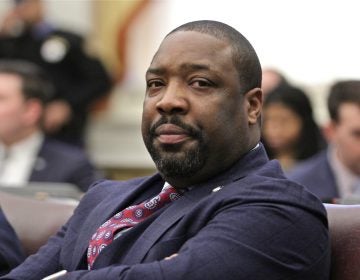Fattah seeks appeal in federal corruption conviction
Lawyers for the disgraced lawmaker will go before the U.S. 3rd Circuit Court of Appeals to argue Fattah should have been acquitted on several counts and given a new trial.
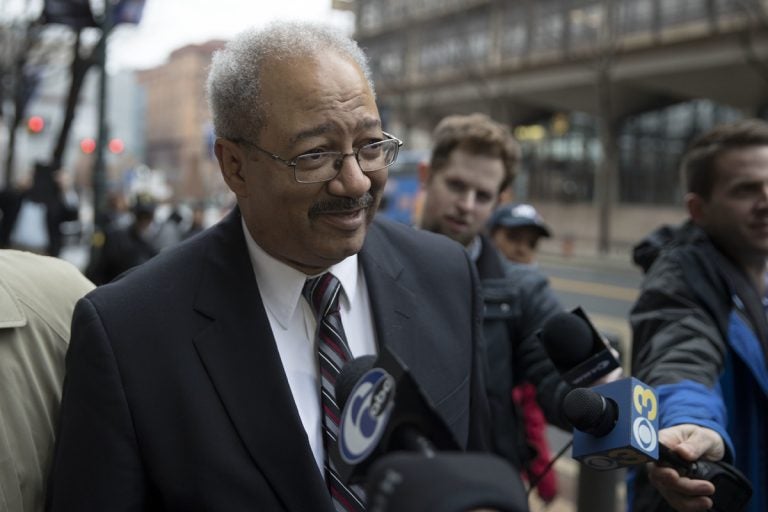
Former Rep. Chaka Fattah, D-Pa., walks from the federal courthouse after his sentencing hearing in Philadelphia, Monday, Dec. 12, 2016. (Matt Rourke/AP Photo)
Roughly a year ago, a federal judge sentenced former U.S. Rep. Chaka Fattah to 10 years behind bars for leading a group of white-collar criminals who stole hundreds of thousands of taxpayer dollars and charitable donations.
Today, lawyers for the disgraced lawmaker will go before the U.S. 3rd Circuit Court of Appeals to argue Fattah should have been acquitted on several counts and given a new trial on the rest.
It may not be easy.
“The odds are against you,” said veteran prosecutor L. George Parry. “There are precious few criminal convictions that get overturned on appeal.”
Fattah’s attorneys say the lower court violated the former congressman’s constitutional right to a fair jury when a juror was dismissed on the second day of deliberations.
They also argue Fattah’s bribery conviction should be overturned by a recent U.S. Supreme Court decision.
Attorney Bruce Merenstein, who wrote Fattah’s appeal, declined comment.
U.S. District Judge Harvey Bartle III, who presided over Fattah’s monthlong trial, dismissed Timothy Miller because he was “intent” on hanging the jury “no matter what the law is, no matter what the evidence is,” according to court documents.
During the first few hours of jury deliberations, Miller was the only one on the 12-person panel who didn’t want to convict Fattah. He didn’t think federal prosecutors presented strong enough evidence, according to court documents.
His fellow jurors – several of whom Bartle questioned – called him “argumentative” said he had an “ax to grind” with the government.
Fattah’s lawyers argue his behavior was not grounds for dismissal.
“While there was no basis to question the jurors in the first place, what that questioning and the two juror notes that precipitated the questioning revealed was nothing more than healthy disagreements over the merits and normal deliberations among jurors in a criminal case,” wrote Merenstein.
Three days after Miller was dismissed, a reconstituted jury later convicted Fattah of all 22 charges against him.
Fattah’s attorneys argue the 3rd Circuit should drop all counts tied to the congressman’s dealings with former Philadelphia Deputy Mayor Herbert Vederman.
The reason: McDonnell v. United States.
Six days after Fattah was convicted, the U.S. Supreme Court overturned the bribery conviction of former Virginia Gov. Robert McDonnell.
In its ruling, the high court narrowed the legal definition of an “official act,” saying that “setting up a meeting, calling another public official, or hosting an event does not, standing alone, qualify as an ‘official act.’
Fattah accepted nearly $30,000 from Vederman.
In exchange, Fattah got Vederman’s girlfriend a job in one of his congressional offices. He also wrote letters to U.S. Sen. Bob Casey and President Barack Obama with hopes of landing Vederman a U.S. ambassadorship.
“Because the “official acts” relied on by the government in this case — writing letters or emails, arranging phone calls, and hiring a staff person — do not meet the Supreme Court’s definition of “official acts,” judgment of acquittal must be entered on a number of the charges against Mr. Fattah or, at the minimum a new trial ordered because of the trial court’s erroneous jury instructions,” wrote Merenstein.
Parry, a veteran prosecutor, said both arguments are valid, but said he’d be surprised if the appeal goes Fattah’s way.
“It’s a matter of reality, one of the unspoken considerations in all of this is whether or not [The 3rd Circuit Court of Appeals] want this case retried with all of the time, expense and effort that would be involved,” said Parry.
In addition to accepting bribes, Fattah was convicted of taking an illegal $1 million loan to fund his failing bid for Philadelphia mayor in 2007, then stealing taxpayer dollars and charitable donations to repay part of the loan he didn’t use.
Four co-defendants, including Vederman, were convicted alongside Fattah.
Fattah, who lead the Second Congressional District for more than two decades, is serving his sentence at FCI McKean, a medium security prison nearly six hours from Philadelphia.
WHYY is your source for fact-based, in-depth journalism and information. As a nonprofit organization, we rely on financial support from readers like you. Please give today.



